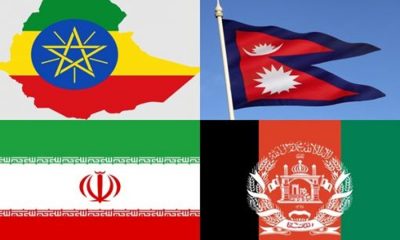Business
GlaxoSmithKline shuts down in Nigeria amid economic downturn after over 50 years of operations

GlaxoSmithKline shuts down in Nigeria amid economic downturn after over 50 years of operations
GlaxoSmithKline (GSK) Consumer Nigeria Plc on Thursday disclosed that it will shut down its production line in Nigeria due to unfavourable economic situation.
The company said it plans to stop operations after evaluating the options for moving to a third-party distribution model for its pharmaceutical products.
The company is well-known for its products such as Augmentin, Neosporin, Panadol, Sensodyne, Advair, Ventolin, Theraflu, among others.
GSK Nigeria announced the development in a statement sent to the Nigeria Exchange Limited (NGX) on Thursday and signed by Frederick Ichekwai, the company secretary.
The company said it is working with its advisers to agree on next steps and plans to submit a scheme of arrangement to the Securities and Exchange Commission (SEC), which if approved, will see it return cash to shareholders except its parent company, GSK UK.
READ ALSO:
- ENDSARS: Fresh stench from Sanwo-Olu’s mass grave (2)
- Afrobasket Women’s Championship: Nigeria’s D’Tigress crush host to reach final
- NRC transforms abandoned property into commercial complex, completes police station in Apapa
The company, which employs over 290 people, assured that all necessary legal proceedings would be met as regards employees and shareholders.
‘In our published Q2 results we disclosed that the GSK UK Group has informed GlaxoSmithKline Consumer Nigeria PLC of its strategic intent to cease commercialization of its prescription medicines and vaccines in Nigeria through the GSK local operating companies and transition to a third-party direct distribution model for its pharmaceutical products,” the statement reads.
“The Haleon Group has also separately informed the Board of its intent to terminate its distribution agreement in the coming months and to appoint a third-party distributor in Nigeria for the supply of its consumer healthcare products.
Advertisement
“For the above reasons, and having, together with GSK UK, evaluated various other options, the Board of GlaxoSmithKline Consumer Nigeria Plc has concluded that there is no alternative but to cease operations.
“Today we are briefing our employees whom we will treat fairly, respectfully and with care, meeting all applicable legal and consultation requirements.
“The Board is conscious that shareholders will have many questions; we have been working assiduously with our professional advisors to agree on next steps and we will be shortly submitting to the Securities and Exchange Commission (“SEC”) a draft Scheme of Arrangement which may, if approved, see shareholders other than GSK UK, receive an accelerated cash distribution and return of capital.
“The Board acknowledges the support of the GSK Group in its intentions to make this possible, full details of which we hope to publish shortly. In the meantime, however, we cannot give you assurance of the final terms of any scheme, or that any scheme will be approved by the SEC or by shareholders.
“Shareholders are advised to seek professional advice and continue to exercise caution when dealing in the company’s shares until a further announcement is made.”
GlaxoSmithKline shuts down in Nigeria amid economic downturn after over 50 years of operations
Auto
Yuletide: Chisco deploys new luxury, mini buses, top quality services

Yuletide: Chisco deploys new luxury, mini buses, top quality services
…hails Tinubu for 50% fare rebate

Nigeria’s Transport Company of the Year, Chisco Transport Ltd, has deployed in various routes nationwide its newly procured new luxury and mini buses with the latest innovative features in the industry.
It assured the travelling public of safe and top quality services on all its routes this Christmas/New Year season, and beyond.
It stated this in a statement released on Tuesday, adding that the company, which had been one of the country’s front runners in long distance passenger transportation and logistics for over 45 years, recently inaugurated about four new branches in order to bring its services closer to its teeming customers.
It listed some of the new branches that had helped to boost service delivery this Yuletide season as in Awka, Enugu, and on Okota Road (near Cele Bus Stop on Oshodi-Apapa expressway), Lagos.
It stated, “This is in addition to embarking on a comprehensive maintenance of the existing fleet of buses in order to ensure they are in roadworthy shape for trips across Nigeria and the Lagos-Cotonou-Lome-Accra international route.
“Apart from advanced safety features like real-time GPS tracking and efficient safety systems, the new-look Chisco Transport fleet, featuring state-of-the-art buses, has all it takes to guarantee that passengers travel in style with their comfort and safety prioritised this season.”
It stated that the updated fleet had enhanced the popular Chisco 24 to 48-hour nationwide mail and parcel services.
All these, the leading transport solutions and logistics provider said, are part of deliberate efforts to ensure seamless and comfortable bus and logistic services to the customers during the 2024 Yuletide season and thereafter.
Chisco’s Head of Business Operations, Mr Buchi Ochuba, in the statement explained that the same commitment to ensuring safe and comfortable trips out of major cities and towns before Christmas, would also be deployed to return journeys in the new year.
He said that the management was aware that the huge investments the company had been making towards upscaling its services recently earned it the Transport Company of the Year at the recent Nigeria Auto Journalists Association (NAJA) Awards in Lagos.
Ochuba reiterated Chisco Transport’s resolve to sustain the high standards that earned the company an enviable reputation, as well as continue investments in safety and comfort of travellers that have earned it the confidence of the travelling public and the auto journalists’ award.
“We appreciate the fact that in adjudging Chisco Transport the Transport Company of the Year, NAJA must have taken into consideration the high standards of our services, the over 50 new air-conditioned buses we procured recently, the new branches we inaugurated, our customer reward scheme and other investments we made to enhance passenger transportation and logistics,” Ochuba stated.
According to him, everything is in place to make certain that the teeming Chisco Transport customers all over Nigeria and on the international route enjoy top quality services, adding “We wish them a wonderful Christmas and a highly prosperous 2025.”
Chisco Transport also applauded President Bola Tinubu for the gesture of subsidising inter-state luxury bus transport fares by 50 percent this Christmas season.
Drawing attention to the importance of infrastructure to the road transportation business, the statement further commended the President for the appreciable allocations for the sector in the 2025 budget.
“We, therefore, wish to urge members of his cabinet to put in more deliberate efforts to help the President attain his vision with speedy and prudent execution inspired by patriotism.”
On the current sharp increase in fares across the routes, the award-winning transport company blamed the situation on rising costs of maintaining the buses, as well as on the high pump prices of diesel and petrol.
The Head of Operations, however, added that at the peak of every Christmas season, long distance buses are almost empty during return trips, which leads to a situation whereby the fares for the first journeys are raised to cushion the losses incurred during reverse trips.
Business
Naira exchanges N1,650/$ in parallel market

Naira exchanges N1,650/$ in parallel market
Yesterday, the Naira appreciated N1,650 per dollar in the parallel market, compared to N1,655 on Monday.
Similarly, the Naira appreciated to N1,535 per dollar in the official foreign exchange market.
Data published by the Central Bank of Nigeria, CBN, showed that the exchange rate for the Nigerian Foreign Exchange Market (NFEM) fell to N1,535 per dollar from N1,537 per dollar on Monday, indicating N2 appreciation for the naira.
READ ALSO:
- Tension as Anambra community union asks monarch to stop Ofala Festival
- Exchange rate ends 2024 at N1,535/$1, marking a 40.9% depreciation
- Lagos govt clears traders from rail tracks at Bolade, Oshodi
Consequently, the margin between the parallel market and NFEM rate narrowed to N115 per dollar from N118 per dollar on Monday.
Naira exchanges N1,650/$ in parallel market
Business
Exchange rate ends 2024 at N1,535/$1, marking a 40.9% depreciation

Exchange rate ends 2024 at N1,535/$1, marking a 40.9% depreciation
The exchange rate between the naira and the dollar ended the year at N1,535/$1 representing a 40.9% depreciation for 2024.
The official exchange rate between the naira and dollar closed in 2023 at N907.11/$1 thus depreciating by 40.9% for the year which compares to a 49.1% devaluation at the end of 2023.
READ ALSO:
- Lagos govt clears traders from rail tracks at Bolade, Oshodi
- Four countries that won’t celebrate New Year
- Social media abuzz over Fayose claim of N50m donation to VeryDarkMan’s NGO
Nigeria introduced several foreign exchange policies in 2024 as the central bank expanded on market-friendly forex policies to attract foreign investors.
Meanwhile, on the parallel market where the exchange rate is sold unofficially, the naira exchanged for N1,660 to the dollar when compared to N1,215/$ according to Nairametrics tracking records. This represents a 26.8% depreciation.
Exchange rate ends 2024 at N1,535/$1, marking a 40.9% depreciation
-

 metro3 days ago
metro3 days agoFarotimi to pursue disbarment over arrest, defamation allegations
-

 Business2 days ago
Business2 days agoReal reason Dangote, NNPC drop petrol price — IPMAN
-

 Health2 days ago
Health2 days agoABU Teaching Hospital will begin kidney transplant in 2025 – CMD
-

 Sports1 day ago
Sports1 day agoAnthony Joshua prostrates before Governor Abiodun during Ogun visit
-

 metro23 hours ago
metro23 hours agoWanted terrorist commander, Bello Turji, a dead man walking – DHQ
-

 metro3 days ago
metro3 days agoNigerian govt urged to intervene in Mozambique post-election violence
-

 metro22 hours ago
metro22 hours agoFour countries that won’t celebrate New Year
-

 metro1 day ago
metro1 day agoN180m not missing from my account, it was all a plan – Verydarkman











